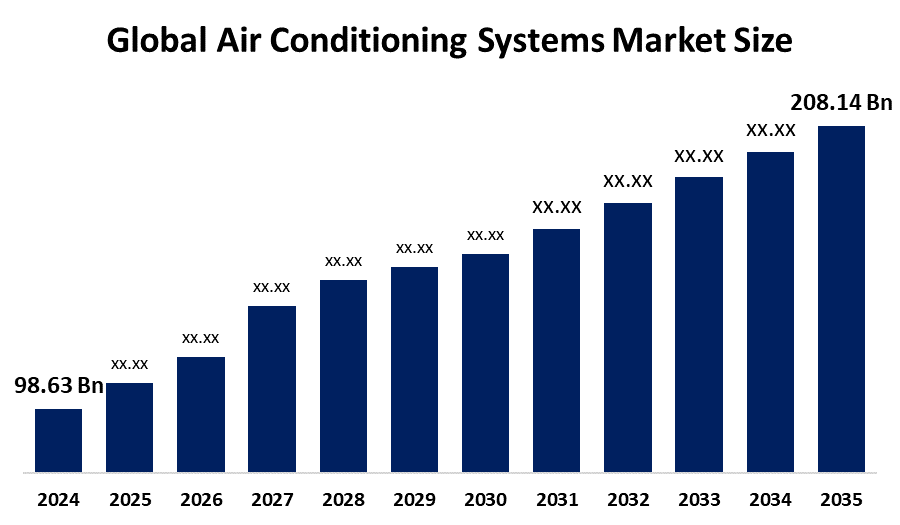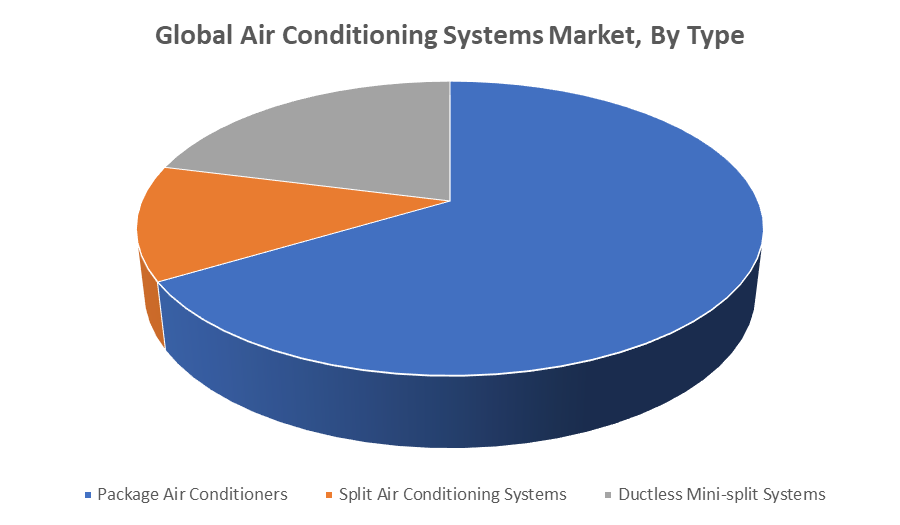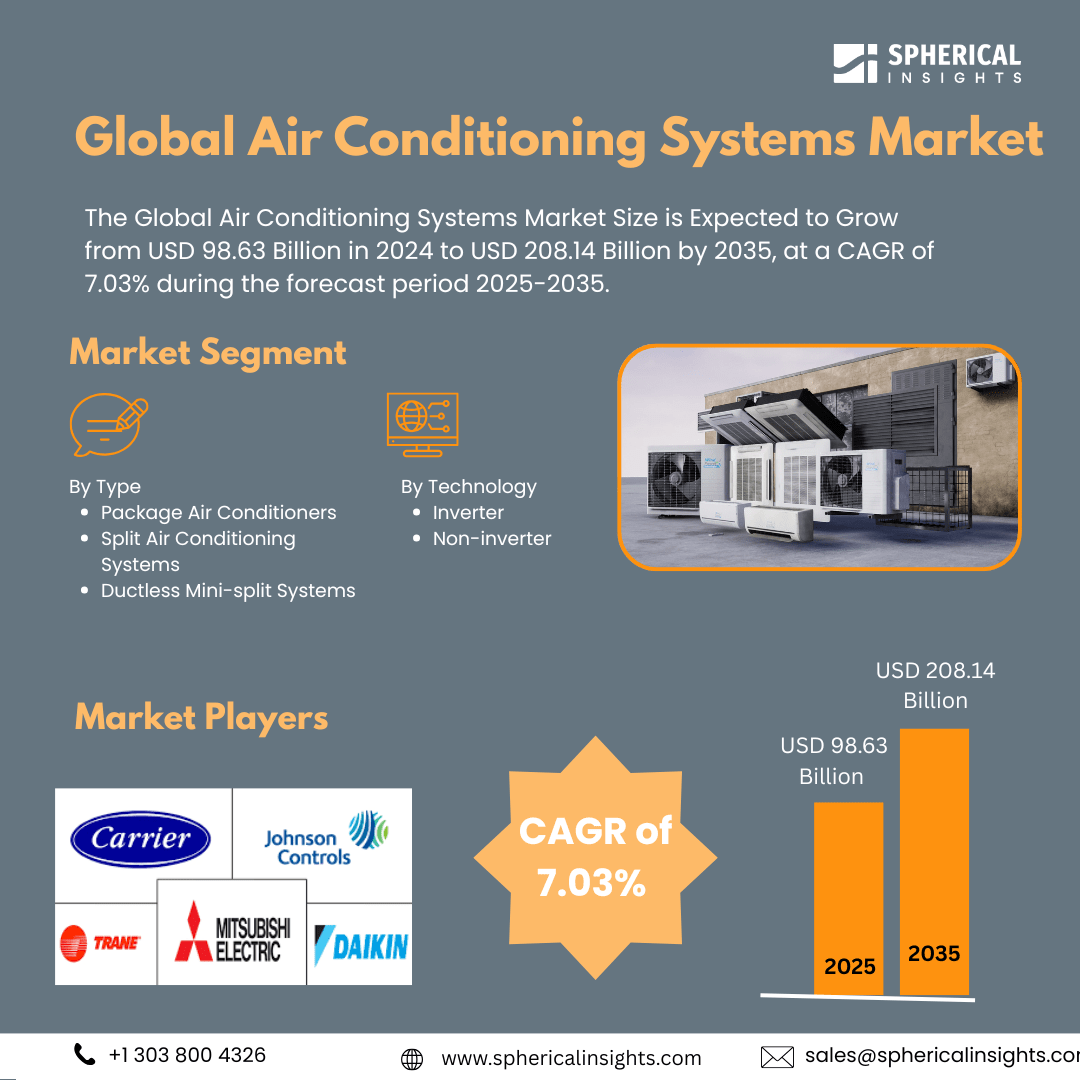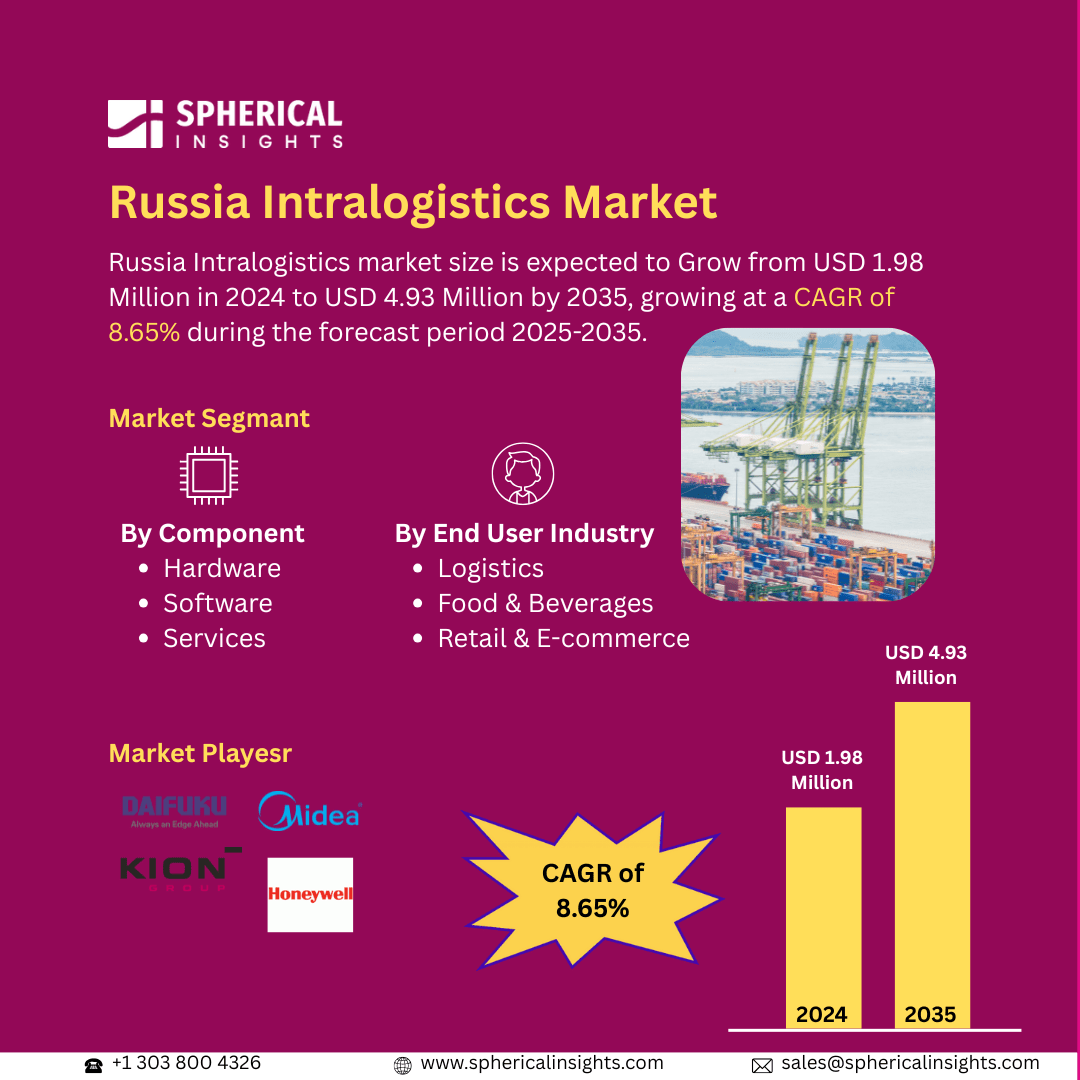Global Air Conditioning Systems Market Insights Forecasts to 2035
- The Global Air Conditioning Systems Market Size Was Estimated at USD 98.63 Billion in 2024
- The Market Size is Expected to Grow at a CAGR of around 7.03% from 2025 to 2035
- The Worldwide Air Conditioning Systems Market Size is Expected to Reach USD 208.14 Billion by 2035
- North America is expected to grow the fastest during the forecast period.

Air Conditioning Systems Market
The Global Air Conditioning Systems Market Size is a dynamic sector driven by rising urbanization, climate change, and increasing demand for energy-efficient cooling solutions. Air conditioning systems include split units, chillers, window units, and central systems, serving residential, commercial, and industrial sectors. Government initiatives promoting energy efficiency, such as the U.S. ENERGY STAR program, India's ECBC, and Europe’s F-Gas Regulation, are influencing market trends and encouraging the adoption of eco-friendly technologies like inverter-based and solar-powered ACs. In developing nations, rapid infrastructure growth and rising disposable income are fueling market expansion, while in developed countries, retrofitting older systems with energy-efficient alternatives is a key focus. Additionally, smart technologies, including IoT-enabled HVAC systems, are gaining traction for their efficiency and remote-control capabilities. However, environmental concerns and regulatory pressures to reduce greenhouse gas emissions are prompting innovation in refrigerants and system design. Overall, the market is poised for steady growth with a strong emphasis on sustainability.
Attractive Opportunities in the Air Conditioning Systems Market
- Growing consumer interest in energy management and convenience is driving demand for smart, connected air conditioning systems. These technologies offer remote control, predictive maintenance, and optimized energy use, creating a strong opportunity for innovation and market growth.
- Rapid urbanization, rising disposable incomes, and infrastructure development in emerging regions create vast untapped potential for air conditioning adoption. These markets present opportunities for affordable, energy-efficient solutions tailored to local needs.
- Increasing demand for green buildings and sustainability is encouraging manufacturers to develop inverter-based systems, alternative refrigerants, and solar-powered ACs. Government incentives and energy efficiency programs further support this transition, making eco-friendly cooling a key growth area.
Global Air Conditioning Systems Market Dynamics
DRIVER: Rising global temperatures and increased frequency of heatwaves
Rising global temperatures and increased frequency of heatwaves are boosting demand for cooling solutions. Rapid urbanization and expanding construction in residential and commercial sectors further support market expansion. Technological advancements, such as energy-efficient inverter-based systems and smart HVAC technologies, are attracting consumers seeking cost-effective and eco-friendly options. Additionally, government regulations promoting energy efficiency and the phasing out of harmful refrigerants are encouraging innovation. Growing disposable income in emerging economies also contributes to increased adoption of air conditioning systems across various end-user segments worldwide.
RESTRAINT: Energy consumption remains a concern
The global air conditioning systems market faces several restraining factors. High initial installation and maintenance costs can deter consumers, especially in price-sensitive regions. Energy consumption remains a concern, as inefficient systems contribute to higher electricity bills and environmental degradation. Strict government regulations on refrigerants due to their environmental impact are increasing compliance costs for manufacturers. Additionally, limited access to electricity and infrastructure in some developing regions hampers market penetration. Seasonal demand variations also affect consistent sales. Lastly, growing awareness of the environmental impact of traditional cooling systems is prompting some consumers to seek alternative, less energy-intensive climate control solutions.
OPPORTUNITY: Government incentives and energy efficiency programs
The increasing adoption of smart and IoT-enabled AC systems offers opportunities for improved energy management and user convenience. Growing demand for green buildings and sustainable construction is encouraging the development of eco-friendly and energy-efficient cooling solutions. Emerging markets in Asia, Africa, and Latin America present vast untapped potential due to rising urbanization, economic growth, and improved living standards. Additionally, innovations in alternative refrigerants and solar-powered AC systems align with global efforts to reduce carbon emissions. Government incentives and energy efficiency programs further support market expansion, making the integration of sustainable and smart technologies a key area of opportunity for manufacturers and service providers.
CHALLENGES: Complexity of smart and connected AC technologies may create barriers
Environmental concerns over traditional refrigerants have led to stringent global regulations, pushing manufacturers toward costly redesigns and sustainable alternatives. High upfront installation and maintenance expenses deter buyers in budget-conscious markets. The complexity of smart and connected AC technologies may create barriers for less tech-savvy users. In developing regions, unreliable power infrastructure limits system deployment. Additionally, seasonal demand swings create supply chain inefficiencies and revenue instability for industry players.
Global Air Conditioning Systems Market Ecosystem Analysis
The global air conditioning systems market ecosystem includes component suppliers, OEMs, distributors, and tech providers. Key players like Daikin, Carrier, LG, and Voltas dominate manufacturing, supported by suppliers such as Sanhua and Carel. Smart technologies, including IoT and inverter systems, enhance efficiency. Government regulations and sustainability efforts drive adoption of eco-friendly refrigerants. Distribution spans residential, commercial, and industrial sectors. Growing demand in emerging markets and heatwave-driven consumption boost market growth, while infrastructure and energy challenges shape strategic developments.
Based on the type, the package air conditioners segment accounted for the largest share over the forecast period

The package air conditioners segment is expected to account for the largest market share over the forecast period. This dominance is driven by their compact design, ease of installation, and ability to provide efficient cooling for large spaces, making them ideal for commercial buildings, shopping malls, hospitals, and institutions. Their all-in-one configuration, combining compressor, condenser, and evaporator in a single unit, reduces space and installation costs. Additionally, rising demand for centralized cooling solutions in both developing and developed regions supports the growth of this segment.
Based on the technology, the inverter segment dominated the global air conditioning systems market in 2024
The inverter segment dominated the global air conditioning systems market in 2024. This is due to its superior energy efficiency, quieter operation, and ability to maintain consistent indoor temperatures by adjusting compressor speed. Inverter ACs reduce electricity consumption compared to traditional fixed-speed units, making them increasingly popular among environmentally conscious consumers and in regions with high energy costs. Growing awareness of energy-saving benefits and stricter government regulations on efficiency standards further drive the adoption of inverter technology worldwide.
Asia Pacific is anticipated to hold the largest market share of the air conditioning systems market during the forecast period
Asia Pacific is anticipated to hold the largest market share of the air conditioning systems market during the forecast period. Rapid urbanization, rising disposable incomes, and increasing construction activities in countries like China, India, and Southeast Asia are key drivers. The region's growing demand for residential and commercial cooling solutions, coupled with hot and humid climate conditions, fuels market growth. Additionally, government initiatives promoting energy-efficient and eco-friendly air conditioning technologies further support the expansion of the market in this region.
North America is expected to grow at the fastest CAGR in the air conditioning systems market during the forecast period
North America is expected to grow at the fastest CAGR in the air conditioning systems market during the forecast period. Factors driving this growth include increasing adoption of advanced energy-efficient and smart HVAC technologies, rising construction of commercial and residential buildings, and growing awareness about indoor air quality. Additionally, stringent government regulations promoting environmentally friendly refrigerants and energy-saving systems are encouraging market expansion. The region’s focus on retrofitting existing systems with modern air conditioners also contributes to the rapid growth in demand.
Recent Development
- In May 2025, Samsung Electronics announced the acquisition of German air conditioning and heating systems manufacturer FlaktGroup for €1.5 billion ($1.68 billion). This move aims to strengthen Samsung's capabilities in cooling solutions for high-demand data centers, particularly those supporting artificial intelligence workloads.
- In May 2025, Bosch acquired a majority stake in Johnson Controls-Hitachi Air Conditioning India (JCHAI), significantly boosting its presence in India's home appliances market. This acquisition aligns with the increasing demand for home cooling solutions amid rising urbanization and climate change impacts across the country.
Key Market Players
KEY PLAYERS IN THE AIR CONDITIONING SYSTEMS MARKET INCLUDE
- Daikin Industries Ltd.
- Carrier Global Corporation
- LG Electronics Inc.
- Mitsubishi Electric Corporation
- Hitachi Ltd.
- Trane Technologies plc
- Gree Electric Appliances Inc.
- Haier Group Corporation
- Panasonic Corporation
- Voltas Limited
- Bosch Thermotechnology
Market Segment
This study forecasts revenue at global, regional, and country levels from 2020 to 2035. Spherical Insights has segmented the air conditioning systems market based on the below-mentioned segments:
Global Air Conditioning Systems Market, By Type
- Package Air Conditioners
- Split Air Conditioning Systems
- Ductless Mini-split Systems
Global Air Conditioning Systems Market, By Technology
Global Air Conditioning Systems Market, By Regional Analysis
- North America
- Europe
- Germany
- UK
- France
- Italy
- Spain
- Russia
- Rest of Europe
- Asia Pacific
- China
- Japan
- India
- South Korea
- Australia
- Rest of Asia Pacific
- South America
- Brazil
- Argentina
- Rest of South America
- Middle East & Africa
- UAE
- Saudi Arabia
- Qatar
- South Africa
- Rest of the Middle East & Africa
FAQs
Q: What is the market size of the Global Air Conditioning Systems Market in 2025?
A: The Global Air Conditioning Systems Market size was estimated at USD 98.63 billion in 2024 and is expected to grow significantly in 2025.
Q: What are the main drivers of growth in the Air Conditioning Systems Market?
A: Rising global temperatures, increasing frequency of heatwaves, rapid urbanization, technological advancements such as inverter-based systems, and government regulations promoting energy efficiency are major growth drivers.
Q: What challenges are limiting the adoption of air conditioning systems?
A: High installation and maintenance costs, energy consumption concerns, strict refrigerant regulations, limited electricity access in some regions, and the complexity of smart AC technologies are key challenges.
Q: What opportunities exist in the Global Air Conditioning Systems Market?
A: Opportunities include growing demand for smart and connected AC systems, rising infrastructure development in emerging markets, government incentives for energy efficiency, and innovations in alternative refrigerants and solar-powered ACs.
Q: Which type segment accounted for the largest share of the Air Conditioning Systems Market?
A: The package air conditioners segment accounted for the largest share, driven by their compact design, ease of installation, and efficiency in large commercial spaces.
Q: Which technology segment dominated the market in 2024?
A: The inverter segment dominated the market in 2024 due to superior energy efficiency, quieter operation, and better temperature control.
Q: Who are the key players operating in the Global Air Conditioning Systems Market?
A: Leading companies include Daikin Industries Ltd., Carrier Global Corporation, LG Electronics Inc., Mitsubishi Electric Corporation, Hitachi Ltd., Trane Technologies plc, Gree Electric Appliances Inc., Haier Group Corporation, Panasonic Corporation, Voltas Limited, and Bosch Thermotechnology.
Q: What recent developments have impacted the Air Conditioning Systems Market?
A: In May 2025, Samsung Electronics acquired FlaktGroup to enhance cooling solutions for data centers, and Bosch acquired a majority stake in Johnson Controls-Hitachi Air Conditioning India to boost its presence in the Indian market.
Q: What are the latest trends in the Air Conditioning Systems Market?
A: Increasing adoption of smart, connected, and energy-efficient inverter ACs, use of alternative refrigerants, solar-powered systems, and integration of IoT for enhanced energy management are key trends.
Q: What is the long-term outlook (2025–2035) for the Air Conditioning Systems Market?
A: The market is expected to experience steady growth driven by urbanization, climate change, technological innovation, and a strong emphasis on sustainable and energy-efficient cooling solutions.





